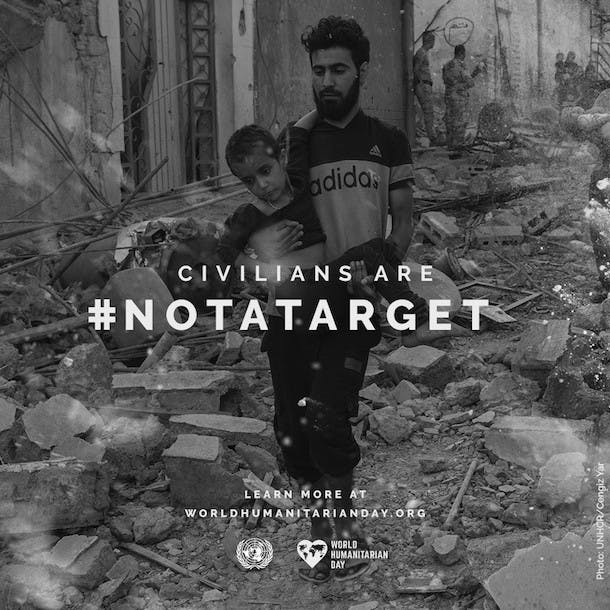
Children should not have to worry about being bombed at school. Women should not have to fear rape used as a weapon of war. And humanitarian aid workers should not be blocked from and targeted for delivering life-saving supplies to people caught in conflict.
International law demands the protection of civilians in conflict, as does our common humanity. Yet today, millions of people suffer inexcusable horrors as parties engaged in conflict ignore laws, often without accountability.
As World Humanitarian Day approaches on August 19, the UN Office for the Coordination of Humanitarian Affairs (OCHA) and partners are urging people around the world to come together and urge international leaders to do more to make sure that civilians in conflict are #NotATarget.
You can add your voice by visiting worldhumanitarianday.org and signing the petition to call on world leaders to take action to protect civilians. To date, more than 5,000 people from 88 countries have signed.
You can also share messages with your social media networks, including showing your solidarity by taking a picture holding a #NotATarget sign.
As part of the #NotATarget campaign, OCHA is highlighting six groups of civilians who need protection, as highlighted in the UN Secretary-General Report on the Protection of Civilians in Armed Conflict: civilians in urban areas; children; targets of sexual violence; humanitarian workers; health workers; and forcibly displaced people.
The petition asks world leaders to:
- Protect civilians in cities and towns, as well as their homes and the essential services they rely on.
- Pledge to protect children by ending their recruitment and use in fighting, and preserve children’s access to education by endorsing the Safe Schools Declaration.
- Prevent all forms of sexual violence in conflict, hold perpetrators fully accountable for their crimes, and offer survivors the opportunities and support that will enable their recovery and reintegration into society.
- Respect the right of people who have been forced to flee their homes to seek asylum in another country; support the United Nations Secretary-General’s effort to reduce internal displacement by half by 2030.
- Ensure aid workers have safe and unimpeded access to deliver humanitarian relief to people in need.
- Allow health workers to treat and care for the wounded and sick regardless of who they are, and end attacks against health workers, ambulances, and hospitals.
By standing with the UN Secretary-General and committed humanitarians everywhere, we ask world leaders to exert all the diplomatic, political, and economic influence they can to ensure all parties to conflict respect and protect civilians.
For the future of a world we all want to live in, we ask you to please add your signature to support this cause.
Add your voice at worldhumanitarianday.org to tell world leaders that civilians are #NotATarget.



 View All Blog Posts
View All Blog Posts